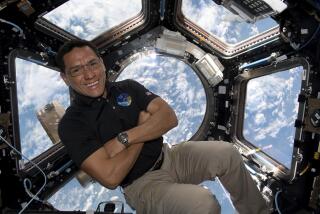Cosmonaut Sees Unlimited Space Travel
- Share via
MOSCOW — Yuri Romanenko, the Soviet cosmonaut who set an endurance record by staying in outer space for 326 days, said Wednesday that he sees no limit to how long human beings can stay in space.
In fact, Romanenko said, he jokingly had told his wife that he would ask that his flight be extended unless the redecoration of their apartment was completed before his return to Earth on Dec. 29.
Romanenko, 43, together with other cosmonauts and space officials, talked with reporters about his mission--and specifically about how the human body holds up under the rigors of space flight.
Romanenko said he felt better after the long stay in space last year than he did after a 96-day mission in 1978. He attributed the change to daily exercises on the longer mission.
After the earlier flight, he said, he was unable to stand or walk by himself, and added: “My legs felt like they were made of lead. I sweated and had palpitations of the heart.”
But after completing the last mission, he said, he stood alone after the landing and ran 100 meters on the day afterward.
As for staying in space even longer, Romanenko said: “Personally, we don’t feel any limitations in this respect. . . . We’re ready.”
Vladimir Shatalov, commander of the cosmonaut training center, said he was encouraged by medical reports from the latest mission on the Soviet space station Mir.
“For one year, a person can work in outer space,” he said. “This doesn’t lead to serious changes, biologically or physiologically. Maybe we can extend the duration gradually. Sooner or later, man will fly to Mars, and Yuri Romanenko’s example gives us hope that after getting there people will be able to walk on the surface of Mars unassisted and conduct studies there.”
The crew that replaced Romanenko and his fellow cosmonauts--Vladimir Titov and Musa Manorov--is expected to stay in space for more than a year.
Anatoly Grigoriev, deputy director of an institute studying biological and medical problems, said that overcoming weightlessness is still a major challenge, but its consequences are temporary and probably have been exaggerated.
“All functional changes are reversible and can be reversed quite rapidly even after such a long mission,” he said.
He said it might be possible to create artificial gravity on space ships of the future, eliminating any effects from weightlessness.
“Experiments with animals indicate that (artificial gravity) helps,” Grigoriev said.
Romanenko, asked about psychological difficulties on his flight, smiled and replied:
“We don’t feel loneliness, even though we are separated by large distances from our country and our family. We are tied to Earth with invisible strings.”
He said that twice-a-week contact with his family by means of a special television hookup helped to boost his spirits.
His wife, he said, arranged to renovate their apartment while he was in orbit--a welcome decision, in his view, since this type of work usually takes weeks or months.
“I dictated an ultimatum,” Romanenko said with a smile. “If the apartment wasn’t ready by the time I was to return, I would ask permission to extend the trip for another couple of weeks.”
V. V. Rumin, head of the space mission control center, said that Romanenko wrote 20 songs during his 326 days in orbit--”optimistic songs, written by a man who feels good.”
Rumin said the Soviet space agency assigned a “psychological support group” of controllers to try to keep cosmonauts in a good mood.
Romanenko said the emotional atmosphere on the flight was not disrupted even when a crewman developed an unusual heartbeat and had to be replaced.
“Space flight is a beautiful world,” he said. “It lets you know each other much better.”
More to Read
Sign up for Essential California
The most important California stories and recommendations in your inbox every morning.
You may occasionally receive promotional content from the Los Angeles Times.













